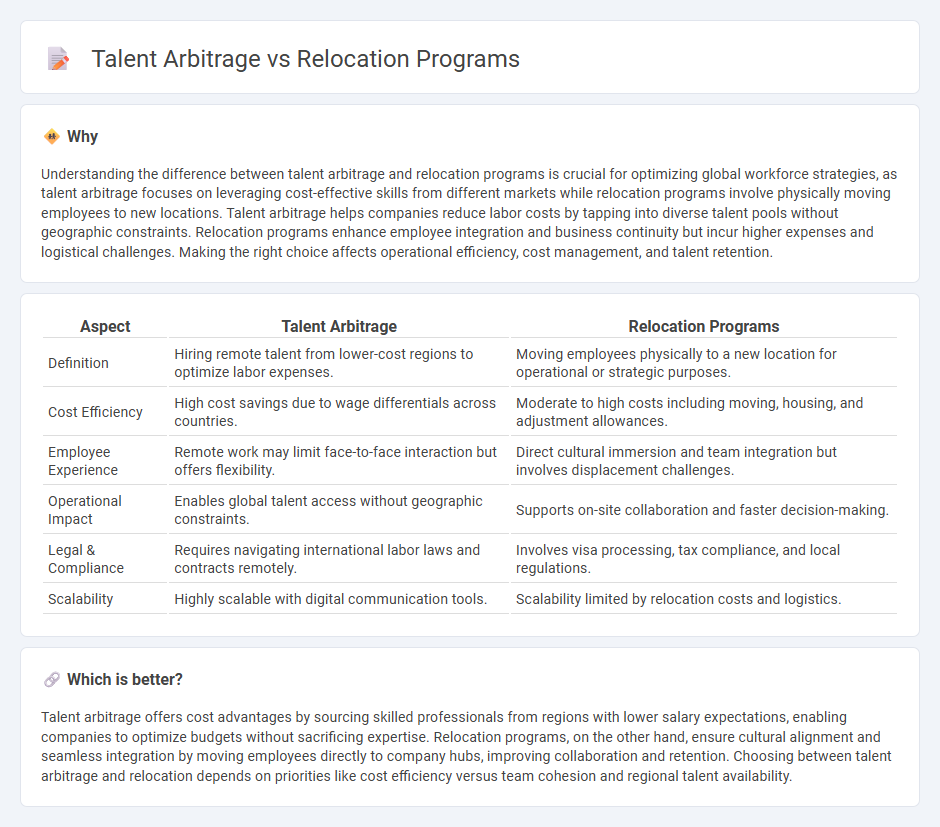
Talent arbitrage leverages global wage disparities to optimize workforce costs by strategically hiring skilled professionals from lower-cost regions. Relocation programs focus on transferring employees across locations to meet business needs while addressing local talent shortages. Explore key differences and advantages to determine the best approach for your organization.
Why it is important
Understanding the difference between talent arbitrage and relocation programs is crucial for optimizing global workforce strategies, as talent arbitrage focuses on leveraging cost-effective skills from different markets while relocation programs involve physically moving employees to new locations. Talent arbitrage helps companies reduce labor costs by tapping into diverse talent pools without geographic constraints. Relocation programs enhance employee integration and business continuity but incur higher expenses and logistical challenges. Making the right choice affects operational efficiency, cost management, and talent retention.
Comparison Table
| Aspect | Talent Arbitrage | Relocation Programs |
|---|---|---|
| Definition | Hiring remote talent from lower-cost regions to optimize labor expenses. | Moving employees physically to a new location for operational or strategic purposes. |
| Cost Efficiency | High cost savings due to wage differentials across countries. | Moderate to high costs including moving, housing, and adjustment allowances. |
| Employee Experience | Remote work may limit face-to-face interaction but offers flexibility. | Direct cultural immersion and team integration but involves displacement challenges. |
| Operational Impact | Enables global talent access without geographic constraints. | Supports on-site collaboration and faster decision-making. |
| Legal & Compliance | Requires navigating international labor laws and contracts remotely. | Involves visa processing, tax compliance, and local regulations. |
| Scalability | Highly scalable with digital communication tools. | Scalability limited by relocation costs and logistics. |
Which is better?
Talent arbitrage offers cost advantages by sourcing skilled professionals from regions with lower salary expectations, enabling companies to optimize budgets without sacrificing expertise. Relocation programs, on the other hand, ensure cultural alignment and seamless integration by moving employees directly to company hubs, improving collaboration and retention. Choosing between talent arbitrage and relocation depends on priorities like cost efficiency versus team cohesion and regional talent availability.
Connection
Talent arbitrage leverages cost differences across global labor markets by relocating skilled employees to regions with lower wages without compromising quality. Relocation programs facilitate this strategic workforce movement by managing visa processes, housing, and integration support to ensure seamless transitions. Companies benefit from reduced labor costs and access to diverse talent pools while maintaining operational efficiency through well-executed relocation initiatives.
Key Terms
Relocation Programs:
Relocation programs provide comprehensive support for employees moving to new locations, covering expenses such as moving costs, housing assistance, and settling-in services to ensure a smooth transition and higher employee retention. These programs are designed to maintain productivity and morale by minimizing the stress associated with geographic transfers, especially in global companies with diverse workforces. Discover more about how strategic relocation programs can optimize workforce mobility and drive organizational success.
Mobility Packages
Relocation programs offer comprehensive mobility packages that include housing assistance, visa processing, and cultural training to support employee transitions in global companies. Talent arbitrage leverages cost differentials by relocating workers to lower-cost regions while optimizing expense management and operational efficiency. Explore detailed insights on structuring effective mobility packages to enhance workforce agility and global talent strategy.
Expatriate Support
Relocation programs provide comprehensive expatriate support, including visa assistance, housing, and cultural integration services, ensuring a smooth transition for international employees. Talent arbitrage focuses primarily on cost-saving by leveraging lower salary markets but may offer limited support for expatriates' personal and professional adjustments. Explore detailed insights on optimizing expatriate support within global relocation strategies.
Source and External Links
Relocation Assistance Programs: Making Your Move Simple and Affordable - Relocation assistance programs provide financial aid to cover moving costs and help individuals, families, and employees relocate, with support from government, nonprofits, or employers to reduce the financial strain of moving.
How to Find Low-Income Relocation Assistance Programs | Chase - Various government and nonprofit programs offer relocation aid including financial help, discounted services, and housing resources targeting low-income individuals, veterans, and disaster-affected persons.
States That Pay You to Move: Exploring Remote Worker Relocation Programs - Several states provide cash incentives up to $25,000 to remote workers who relocate, with programs requiring application preparation, relocation planning, and residency commitments to qualify for benefits.
 dowidth.com
dowidth.com